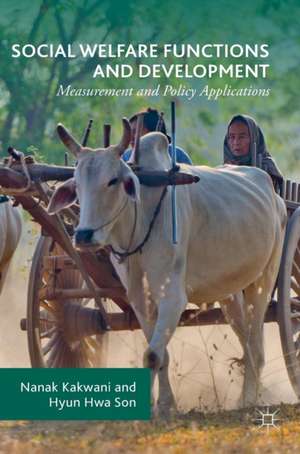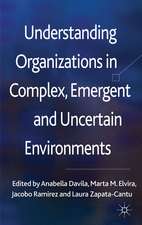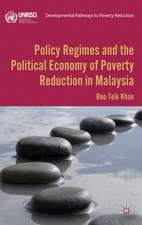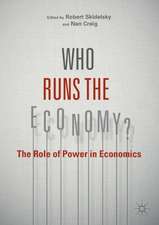Social Welfare Functions and Development: Measurement and Policy Applications
Autor Nanak Kakwani, Hyun Hwa Sonen Limba Engleză Hardback – 19 iul 2016
This study develops indicators that are sensitive to both the level and the distribution of individuals’ capabilities. The idea of the social welfare function, defined in income space, is extended to the concept of the social well-being function, defined in capability space.
Through empirical analysis from selected developing countries, with a particular focus on Brazil, the authors shape techniques appropriate to the analysis of development in different dimensions. The focus of this evidence-based policy analysis is to evaluate alternative policies affecting the capacities of people to enjoy a better life.
Preț: 646.62 lei
Preț vechi: 760.73 lei
-15% Nou
Puncte Express: 970
Preț estimativ în valută:
123.74€ • 134.37$ • 103.95£
123.74€ • 134.37$ • 103.95£
Carte tipărită la comandă
Livrare economică 23 aprilie-07 mai
Preluare comenzi: 021 569.72.76
Specificații
ISBN-13: 9781137583246
ISBN-10: 113758324X
Pagini: 313
Ilustrații: XXIX, 355 p. 35 illus.
Dimensiuni: 148 x 210 x 25 mm
Greutate: 0.59 kg
Ediția:1st ed. 2016
Editura: Palgrave Macmillan UK
Colecția Palgrave Macmillan
Locul publicării:London, United Kingdom
ISBN-10: 113758324X
Pagini: 313
Ilustrații: XXIX, 355 p. 35 illus.
Dimensiuni: 148 x 210 x 25 mm
Greutate: 0.59 kg
Ediția:1st ed. 2016
Editura: Palgrave Macmillan UK
Colecția Palgrave Macmillan
Locul publicării:London, United Kingdom
Cuprins
Foreward-. Preface-. Chapter 1: Introduction-. Chapter 2: Applied Social Welfare Functions-. Chapter 3: Measuring Social Tension-. Chapter 4: Relative Deprivation and Social Groups-. Chapter 5: Growth and Shared Prosperity-. Chapter 6: Income Inequality and Social Well-Being-. Chapter 7: Measuring Equity in Opportunity Using Social Opportunity Function-. Chapter 8: Global Poverty Counts-. Chapter 9: Measuring Food Insecurity: Global Estimates-. Chapter 10: Social Rate of Return: A New Tool for Evaluating Social Programs.
Notă biografică
Nanak Kawkani was Professor of Economics for 30 years at the University of New South Wales in Sydney, Australia, and until 2006 was Principal Researcher and Director at UNDP’s International Policy Centre for Inclusive Growth in Brazil. He was an elected fellow of the Australian Research Committee of Social Science, and has been awarded the Mahalanobis gold medal for outstanding contribution in quantitative economics. He has published over 100 articles in international journals, as well as four books.
Hyun Hwa Son is Principal Evaluation Specialist in the Independent Evaluation Department of the Asian Development Bank (ADB), Philippines, having previously worked as a poverty economist at the United Nations Development Programme. She has held an academic position at Macquarie University in Sydney, Australia, and published extensively on poverty, inequality, pro-poor growth, inclusive growth, education and health.
Hyun Hwa Son is Principal Evaluation Specialist in the Independent Evaluation Department of the Asian Development Bank (ADB), Philippines, having previously worked as a poverty economist at the United Nations Development Programme. She has held an academic position at Macquarie University in Sydney, Australia, and published extensively on poverty, inequality, pro-poor growth, inclusive growth, education and health.
Textul de pe ultima copertă
Nanak Kakwani and Hyu Hwa Son make use of social welfare functions to derive indicators of development relevant to specific social objectives, such as poverty- and inequality-reduction. Arguing that the measurement of development cannot be value-free, the authors assert that if indicators of development are to have policy relevance, they must be assessed on the basis of the social objectives in question.
This study develops indicators that are sensitive to both the level and the distribution of individuals’ capabilities. The idea of the social welfare function, defined in income space, is extended to the concept of the social well-being function, defined in capability space.
Through empirical analysis from selected developing countries, with a particular focus on Brazil, the authors shape techniques appropriate to the analysis of development in different dimensions. The focus of this evidence-based policy analysis is to evaluate alternative policies affectingthe capacities of people to enjoy a better life.
This study develops indicators that are sensitive to both the level and the distribution of individuals’ capabilities. The idea of the social welfare function, defined in income space, is extended to the concept of the social well-being function, defined in capability space.
Through empirical analysis from selected developing countries, with a particular focus on Brazil, the authors shape techniques appropriate to the analysis of development in different dimensions. The focus of this evidence-based policy analysis is to evaluate alternative policies affectingthe capacities of people to enjoy a better life.













